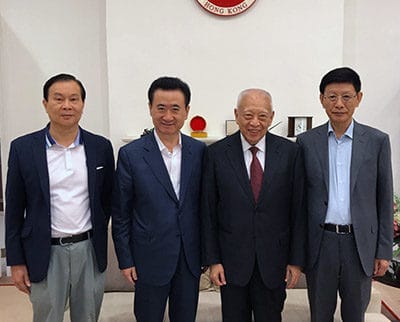
Wang Jianlin has sold off his stake in a $3 billion resort
Dalian Wanda boss Wang Jianlin may no longer be China’s richest man, but he can still make a whole mountain disappear.
Wang’s Dalian Wanda Commercial Properties quietly sold off its equity in the $3 billion Changbaishan International Resort in northeastern China to a close associate this past June, just as Beijing authorities ordered tighter scrutiny of the high-profile developer’s finances, a recent report has revealed.
No financial terms have been announced for the equity transfer between the two firms, but according to an account by Chinese news site The Paper, virtually all of the 21 square kilometre resort in Jilin province is now owned by Dalian Yifang Group, a real estate developer chaired by Sun Xishuang, a billionaire business partner of Wanda chairman Wang Jianlin.
Sun, whose company headquarters is located in Wang’s Wanda Plaza in Beijing — the same complex that houses Dalian Wanda’s corporate base — has a history of facilitating the property conglomerate’s transactions at key times, and has said in interviews that he began investing in Wang’s then-fledgling property firm in 1993.
Wanda Sells Equity, Continues to Manage
Following the unannounced transaction, Yifang now holds a 98.33 percent stake in the resort, while Yonyou Network Technology Co holds the remaining 1.66 percent. Sun has also become the legal representative of the project company, taking over the title from Qi Jie, president of Dalian Wanda Commercial Properties.
After having invested some RMB 20 billion in the project, according to Wanda’s website, the conglomerate continues to operate the winter tourism destination after the ownership change.
The transfer of ownership occurred on June 16, the same week in which China’s banking regulators ordered enhanced scrutiny of lending to a group of acquisitive mainland firms including Wanda. The revelation of this earlier sell-off comes less than two weeks after the beleaguered conglomerate was said to have put its more than $5 billion overseas property portfolio on sale, and follows reports in October that local authorities shut down a pair of golf courses in Changbaishan as part of a nationwide austerity drive.
Investment Binge Hits the Skids

Changbaishan International Resort opened in 2012
Despite reports of Wang’s top-level government connections, and his status as one of China’s richest men, the mall tycoon has been skidding off-piste since his credit-fueled expansion plan fell out of official favor.
In addition to the Changbaishan project, Wang had invested in over a dozen culturally themed tourism destinations across China, vowing in 2015 to transform Wanda Group – the country’s largest commercial property builder – into the world’s leading tourism enterprise.
Those ambitions have now collapsed, with Wanda selling off a 91 percent stake in its portfolio of 13 “cultural tourism” projects to Tianjin-based developer Sunac China this past July. Sunac bought the properties – not including Changbaishan – for RMB 43.8 billion ($6.5 billion) while agreeing to take on RMB 45.4 billion ($6.7 billion) of loans attached to the assets.
The mega-sale followed reports that China’s banking regulator had instructed banks in June to review lending to a group of indebted mainland conglomerates including Wanda, HNA Group and Fosun International on June – just before Wanda sold off its stake in Changbaishan.
Ski Resort Changes Hands, Again

Wang Jianlin (2nd from L) and Sun Xishuang (R) had former HK leader Tung Chee-Hwa surrounded in Sept 2017
Changbaishan opened in July 2012 in the frigid, mountainous region close to the North Korean border. One of the largest tourism projects in China, the resort features 43 ski slopes, Park Hyatt and Westin hotels, a cinema, and an 18-hole golf course designed by Jack Nicklaus along with a 36-hole Robert Trent Jones Jr course.
Wanda teamed up with four other investors including Beijing-based developer China Oceanwide Holdings, game maker Giant Interactive Group and clean energy firm Elion Resources Group, along with Dalian Yifang, to build the resort in 2009.
Through a series of ownership changes over the years, the initial group of five investors dwindled to three, while Wanda progressively boosted its stake in the venture. Giant Interactive dropped out of the project in 2012 and was replaced by Beijing-based software and cloud services provider Yonyou Network Technology (then called UFIDA Software Co).
China Oceanwide and Elion Resources subsequently bailed out, selling their stakes to Wanda, which by April 2016 held an 83 percent share of Changbaishan International Resort Development Company – the firm responsible for developing, operating and managing the property.
Low-Key Billionaire Takes Control
Sun Xishuang, whose firm now owns over 98 percent of the resort, is also said to have collaborated with Wanda on the Xishuangbanna International Resort, a $2.5 billion project that opened in Yunnan province in 2015. The low-profile property baron was the second-largest individual shareholder in Wanda Commercial Properties – with a 6.3 percent stake – when the company was listed on the Hong Kong stock exchange in December 2014, according to reports.
Sun and Wang worked closely on asset transfers more than two years ago during a previous period of close scrutiny of Wanda’s activities. In December 2014, an offshore firm belonging to Sun bought Hoyts Group, Australia’s second-largest cinema chain, from Pacific Equity Partners for an estimated A$900 million ($743 million). Sun’s company then flipped the movie theatre group to Wanda Cinema, in which Sun was also a shareholder, just six months later in June 2015.
The timing for Sun’s original acquisition of Hoyts coincided with Dalian Wanda Commercial Properties’ Hong Kong IPO, when Wang and his firm were centres of attention for many investors in the region.
Leave a Reply